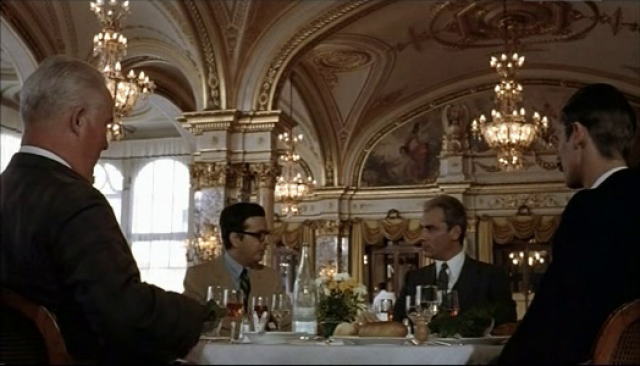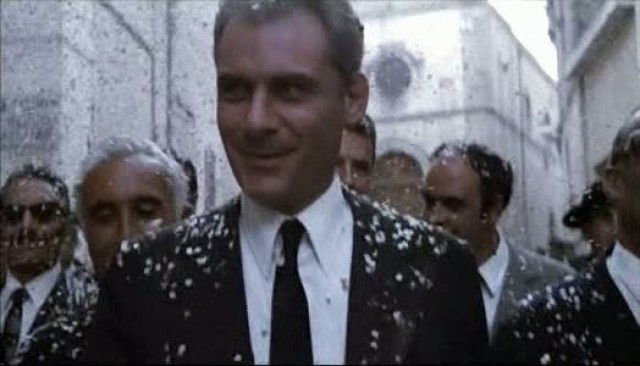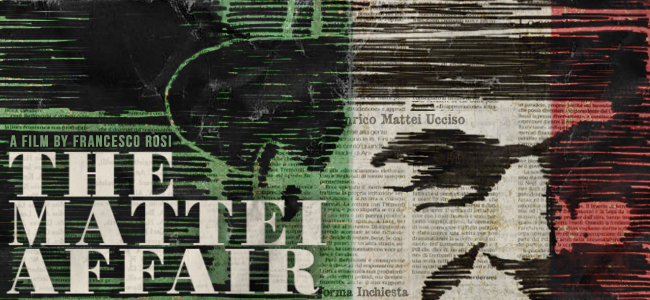From Monthly Film Bulletin, June 1975 (Vol. 42, No. 497). — J.R.
Caso Mattei, Il (The Mattei Affair) Italy, 1972
Director: Francesco Rosi
27 October, 1962. The private plane of Enrico Mattei, president of ENI (Ente Nazional Idrocarburi), flying from Sicily to Milan, crashes in Bascape, killing the pilot Bertuzzi, the Time-Life reporter McHale and Mattei himself. An account follows of both the investigation into the causes of this accident (a mystery that remains unsolved) and of Mattei’s public career, revealing that diverseindividuals and organizations (from the Mafia to the CIA) had reasons for wanting to see him dead. His controversial position grew out of his efforts to use his state oil organization, AGIP, to compete with private individuals, and to deal with Third World oil-producing countries (Algeria, Egypt, Iran, Libya, Morocco, Saudi Arabia, Tunisia) in terms more advantageous than the 50-50 arrangement offered by the major oil companies. This project began in April 1946, when a small methane deposit was discovered in the village of Caviaga, and Mattei decided to exaggerate and exploit its value as a coal substitute in order to create his organization and gain an economic and political foothold. In the investigation running parallel to a re-enactment of his career (the latter culminating in his visit on the day of his death to Gagliano, Sicily, where he is acclaimed as a popular hero), Mauro De Marro, a Sicilian journalist reconstructing the last day of Mattei’s life for the purposes of the present film, suddenly disappears, apparently kidnapped — another unsolved mystery. At the scene of the plane crash, a former statement by Mattei is reiterated: “If I don’t succeed, the people with oil under their feet will”.
Accumulating a variety of materials round en unresolved enigma, Francesco Rosi appears to be attempting in The Mattei Affair a sort of semi-fictional Citizen Kane without a Rosebud, but with a few important differences. Since Enrico Mattei was a man who actually lived, and is explored here solely in terms of his public life (apart from some brief scenes involving his wife near the beginning) – with the overall suggestion that his private life was too minimal to be of any significance – the enigma presented relates not to his character but to his enemies. The throbbing monotonal drone heard at crucial junctures on the soundtrack, comprising a structural and melodramatic equivalent to Rosebud without the accompanying denoement, creates an anxiety-producing void at the edges of Gian Maria Volonté’s charismatic performance roughly equivalent to the absences in political melodramas as diverse as Made in USA and The Parallax View. In its treatment of the career itself, however, and despite a few hints of chicanery, the film is generally much closer to being frankly and persuasively celebratory than ambivalent in the Kane manner, if only because Mattei’s arguments supporting his position — mainly expressed in the form of replies and impromptu lectures to a skeptical journalist –are recorded at some length. Outside a specifically Italian context, where acquaintance with Mattei’s career and its consequences would allow for a more informed response on the part bf the spectator and many details would be likely Jo have stronger resonance, one feels somewhat at a disadvantage in not knowing enough about the man, even after nearly two hours of documentation; but in manyrespects, of course,this drawback can be seen as a tribute to the pedagogical virtues of Rosi’s method, which elicits this curiosity. On the basis of what we are given, one burrows through the predictable catch-phrases (“The most important-Italian since Julius Caesar”; “He had to fail — success was too dangerous for Italy”), comments relating to the film’s mosaic structure (a Time-Life man on the phone: “There’s nothing to do. Bits and pieces scattered all over the place”), and even a jokey reference to the Corleone family, to emerge with an appealing portrait of a patriotic idealist with commitments to the Italian peasantry as well as the Third World that challenged and threatened the assumptions of the international oil monopolies. (Particularly engaging — at least on a rhetorical level — is the explanation he gives to a newsman about his occasional co-operation with fascists: “I use them like a taxi. I get in, let them take me to my destination, look at the meter, pay, and leave”.) Very capably acted, filmed and edited, The Mattei Affair above all sparks interest by dealing with issues that the commercial cinema seldom broaches on any level but the most superficial. If Rosi’s presentation of materials also raises certain questions of its own — as in some rather unclear distinctions between ‘real’ testimonies and apparently re-staged ones — it nevertheless performs the useful task of opening up a subject for our inspection.



